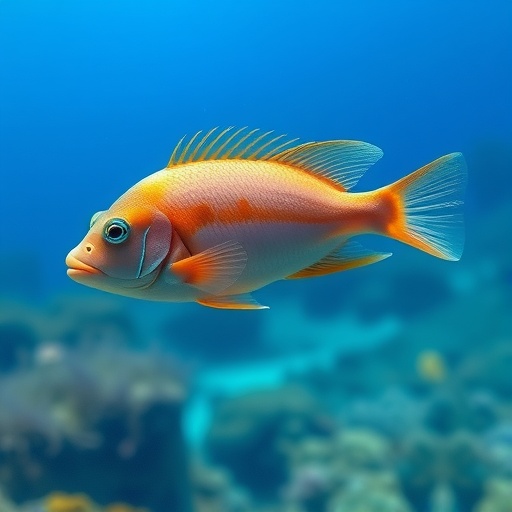In a pioneering and comprehensive examination of the marine biodiversity within the Coral Sea Marine Park, researchers Tea Kyung, Sih T.L., and Walsh F. have unveiled exciting new records of fish species. This significant body of work promises to enhance our understanding of the underwater ecosystems that thrive in this vital region of Australia, which is known for its rich marine biodiversity and ecological significance. As conservation efforts intensify in face of climate change and human impact, such findings play a crucial role in shaping future research directions and conservation strategies.
The Coral Sea Marine Park, established to protect a vast array of marine life, houses numerous fish species, some of which have been underreported in marine biological literature. This study meticulously catalogs newly discovered species alongside previously established ones, providing a holistic view of fish diversity in the park. By integrating ecological data with geographic information, the researchers highlight the importance of this marine reserve as a sanctuary for endangered and lesser-known species, offering a crucial glimpse into the health of marine ecosystems.
The methodology employed by the research team is both rigorous and innovative, encompassing a combination of underwater visual surveys, data analysis, and collaborations with local fisheries. Each new fish species recorded in this study is not merely a token addition; it reflects a robust ecological role within its habitat. The researchers employed a systematic approach, documenting the environment, behavior, and associations of these species, thereby emphasizing their ecological significance in terms of biodiversity and ecosystem stability.
These findings not only contribute significantly to the ongoing dialogue surrounding marine biodiversity but also underline the critical need for continued exploration and research in marine environments that remain under scrutiny. New technological advances in underwater monitoring and data collection have allowed researchers to uncover previously elusive species, presenting an optimistic narrative in the struggle against marine extinction. With global warming and overfishing impacting marine life at unprecedented levels, documenting such biodiversity becomes essential in advocating for protective measures in the Coral Sea.
The study indicates a convergence of results where known species exhibit varying levels of adaptability in their habitats. Some fish populations thrive in areas where human activity exerts influence, while others are severely threatened. For instance, certain newly identified species found in this park demonstrate unique adaptations that enable them to cope with environmental stresses, which may serve as critical insights for conservation efforts. Understanding these adaptations can help in formulating targeted strategies aimed at preserving marine biodiversity and enhancing ecosystem resilience against future challenges.
Additionally, this research opens the door for future inquiries into the ecological interrelationships within the Coral Sea. Identifying and cataloging new fish species is only the beginning; further studies examining their roles in food webs, predator-prey dynamics, and symbiotic relationships with coral reefs are imperative. The interplay between various marine organisms can yield valuable data, promoting a greater overall understanding of ecosystem health.
Globally, endeavors such as these echo the significant push for marine protection in light of the ongoing climate crisis. International coalitions are increasingly prioritizing marine conservation, aligning with sustainability goals as marine research uncovers critical information that informs broader conservation policies. The Coral Sea study aligns with global themes that emphasize the need for international cooperation in protecting marine life and the environments that sustain it.
The researchers have also highlighted the necessity of expanding this work beyond mere documentation. They stress that each new discovery should inspire proactive measures and policies to mitigate risks to marine habitats. The threats posed by climate change, plastic pollution, and overexploitation of fish stocks necessitate a proactive approach in sharing findings with policymakers and the public. This knowledge transfer can advocate for urgent action needed to safeguard these ecosystems and the myriad species they harbor.
Local communities and indigenous populations have often been at the forefront of marine conservation. This study aligns with narratives that promote community engagement in research activities, highlighting the importance of indigenous ecological knowledge. Engaging local fishers and communities in the documentation and protection of marine biodiversity fosters a more sustainable relationship between humans and the sea. It highlights an inclusive model for conservation that can enhance scientific research while promoting social equity.
As this research gains visibility, it is crucial to elevate public awareness regarding the biodiversity contained within marine parks. Disseminating these findings can bolster support for marine protected areas and inspire visitors to the Coral Sea Marine Park to engage in responsible tourism practices. By nurturing a sense of stewardship towards these ecosystems, the research team is contributing to a greater cultural and ecological appreciation for marine environments.
In conclusion, the findings of Tea, Sih, and Walsh signal a watershed moment in our understanding of marine biodiversity within the Coral Sea Marine Park. This research marks not only a significant advancement in documenting fish species but also an urgent call to action for protecting these critical ecosystems. As scientists unveil these hidden gems of the underwater world, they reaffirm that every fish brings with it unique stories and ecological importance. Ultimately, there is no denying the value of these efforts in shaping a future where marine biodiversity can thrive.
vital knowledge in advocacy for the sustainability and conservation of our oceans. The Coral Sea Marine Park, through these scholarly contributions, strives to lead the charge in this global movement, fostering hope and knowledge for generations to come.
Subject of Research: Marine biodiversity in the Coral Sea Marine Park
Article Title: New records of fishes from the Coral Sea Marine Park, Australia
Article References:
Tea, YK., Sih, T.L., Walsh, F. et al. New records of fishes from the Coral Sea Marine Park, Australia.
Coral Reefs 44, 1227–1273 (2025). https://doi.org/10.1007/s00338-025-02664-3
Image Credits: AI Generated
DOI: https://doi.org/10.1007/s00338-025-02664-3
Keywords: Coral Sea, marine biodiversity, fish species, conservation, ecosystem resilience, ecological adaptation, marine protected areas




